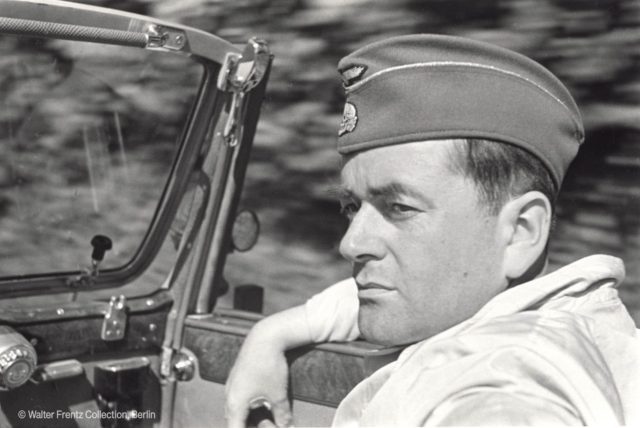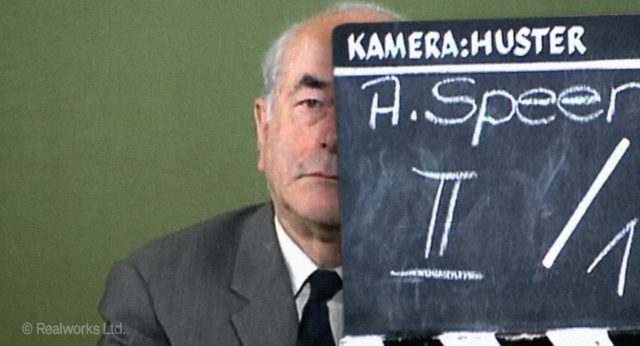
Nazi leader Albert Speer tries to whitewash history in Speer Goes to Hollywood
SPEER GOES TO HOLLYWOOD (Vanessa Lapa, 2021)
Film Forum
209 West Houston St.
Opens Friday, October 29
212-727-8110
filmforum.org
speergoestohollywood.com
In 2014, Belgium-born, Israel-based documentarian Vanessa Lapa made her feature-length debut with The Decent One, in which she painted a frightening portrait of Heinrich Himmler, using the private diary of the Reichsführer of the Schutzstaffel (Himmler’s official title). She has now followed that film with Speer Goes to Hollywood, which incorporates archival footage from the Nuremberg trials and clips from propaganda films accompanying forty hours of recordings made in 1971 by up-and-coming British screenwriter Andrew Birkin as he worked with convicted Nazi leader Albert Speer, known as Hitler’s Architect, collaborating on a screenplay for Paramount Pictures based on the former Reichsminister of Munitions’ bestselling memoir, Inside the Third Reich.
Birkin, the brother of model and actress Jane Birkin and whose mentors include Stanley Kubrick and Carol Reed, met with Speer in the latter’s country home in Heidelberg in the winter of 1971. Birkin kept the tape rolling as he and Speer carefully reviewed every scene in the screenplay, as Speer tries to whitewash many of the more outrageous and gruesome details regarding his culpability in the Nazis’ reign of terror while Birkin tries to not let him off the hook.
“I would be careful,” Reed (The Third Man, Oliver!) warns Birkin over the phone after reviewing the first draft of the script. “You can’t build without him knowing. The man holds his mind blank to that. This is not a sweet man.”
Tall and elegant, Speer seizes control of the narrative again and again, claiming to be a dreamer and making sure he is seen with his dog, as if he’s just a normal guy. “I want a private life too,” he opines. He considers war “an adventure” and the Nazi regime “just good fun” to downplay the piles of murdered bodies the Third Reich left in its wake. He refers to the tortured prisoners of war in factories and the concentration camps as workmen and laborers, making excuses that argue that the negative aspects of what the Nazis did have been exaggerated. “I did not know what crimes I’m committing,” he claims. He explains that the “camps were necessary” and blames his Labor Department head, Fritz Sauckel, for the mistreatment of the Jews and other captives under his watch. “I was not responsible for those things. It was him,” he points out.
All the while, Birkin attempts to convince himself that he is doing the right thing by sharing Speer’s story on film. “I’ve been saying all along that I find it easy to identify myself with you,” he tells Speer. “The only point where I think I would have opted out would have been if I had been present or if I witnessed a scene that involved children being carted off. Can you ever remember a situation where you either read about, or more probably heard about, children being separated up or families being torn apart? Anything. Can you ever remember anything that happened? Even if, at the time, you were able to rationalize it?” Speer says no, “But . . . Yes, well, but you know, small things are now seen as the center of a thing. But I’m sorry. It would be wrong to say now I had a sentimental reaction or so. Your idea of the film and of my person that I had any reaction is wrong.”
Speer talks about Himmler, Hermann Göring, and Joseph Goebbels and admits to being one of Hitler’s best friends — and still claims he did not know what was going on despite his heavy involvement with the Mathausen camp and his visit to Auschwitz. “Indirectly, I knew from Hitler that he was planning to annihilate the Jewish people. He said it quite often. But I had no direct knowledge until ’44.” Seeking to garner some sympathy, he says, “If ever I can get rid of the guilt, and quite often I was thinking that I never shall get rid of it, that this burden will ever last with me.”

Albert Speer is profiled in new documentary built around revelatory footage
Birkin might want to give Speer the benefit of the doubt to some degree, but it’s hard for viewers to see anything but a twisted man who lacks empathy and compassion for his fellow human being, lording his sense of superiority over all others, trying to skirt his responsibilities during the war and rewrite history — a project that cannot help but make one reflect on the way America is these days when it comes to slavery, remembering the Holocaust, removing public statues of the founding fathers, tearing apart immigrant families at the border, and changing textbooks to present partisan views of the nation’s past.
Explaining one of Kubrick’s arguments, Birkin (The Name of the Rose, The Cement Garden) says the director told him, “I would find it very difficult to do the film if your character, the Speer in the film, you still made out that he didn’t know what was going on.” Speer just wanted a normal life, reveling in his being called “the good Nazi,” but as Lapa’s film shows, there is not a whole lot of good in him.
Winner of the Israeli Oscar for Best Documentary, Speer Goes to Hollywood is a chilling work that gets into the mind of one of the twentieth century’s most terrifying figures. Lapa and producer Tomer Eliav will be at Film Forum for the 7:00 shows on October 29 and 30 for Q&As that will dig even deeper into this extraordinary story.